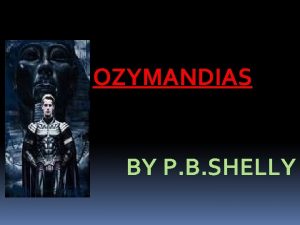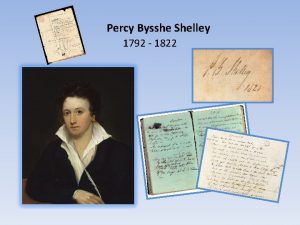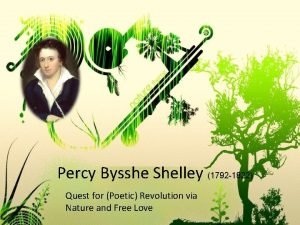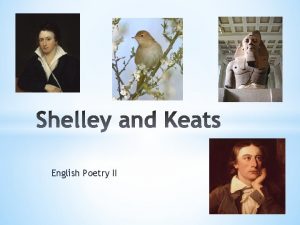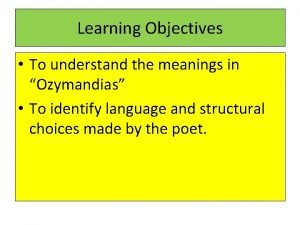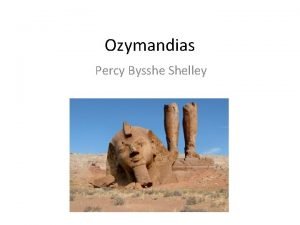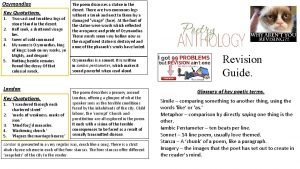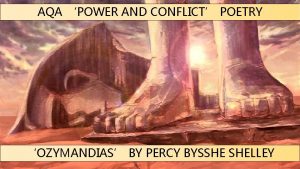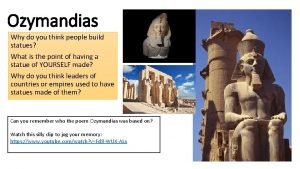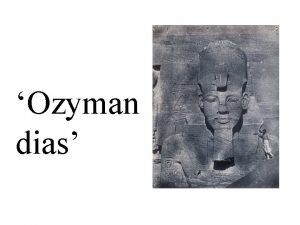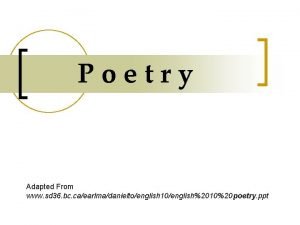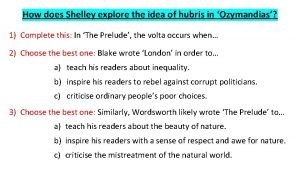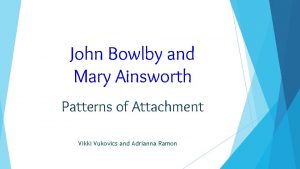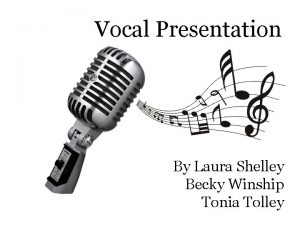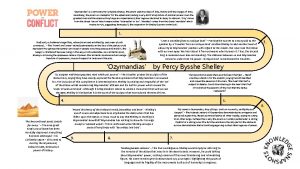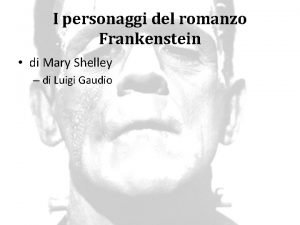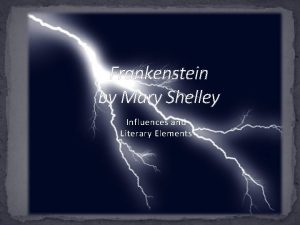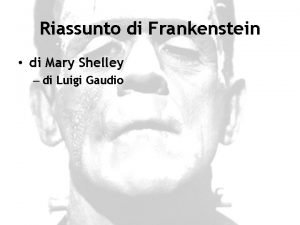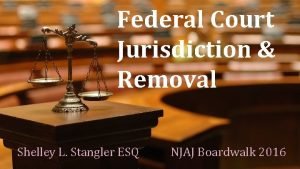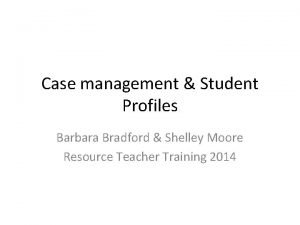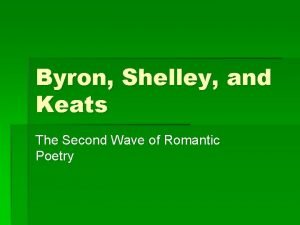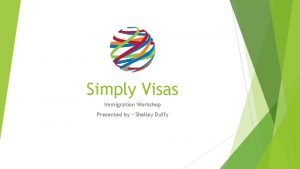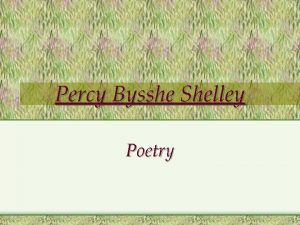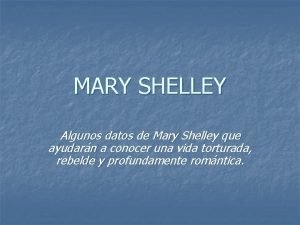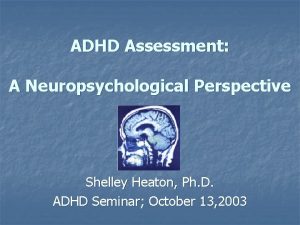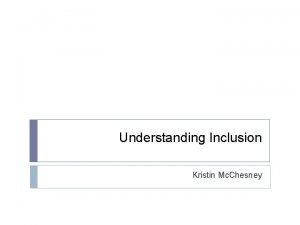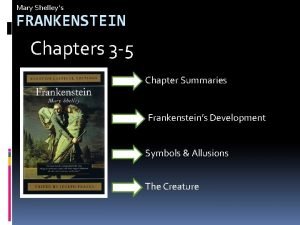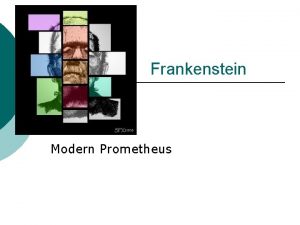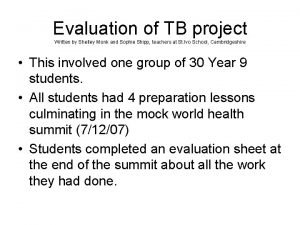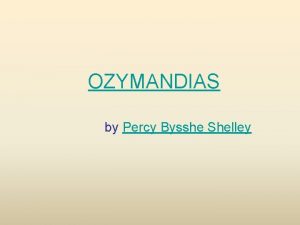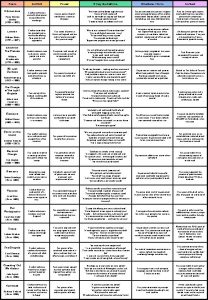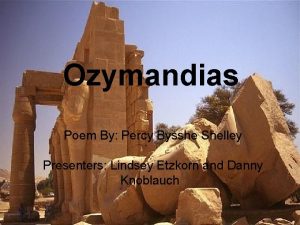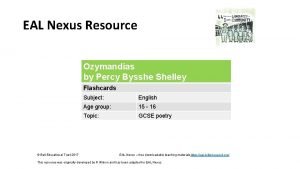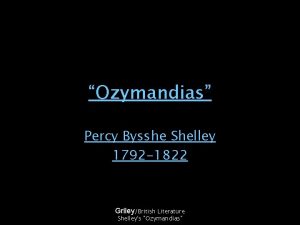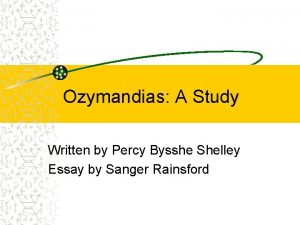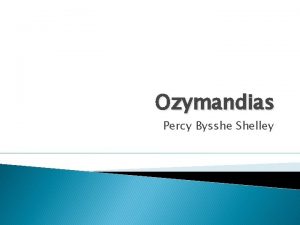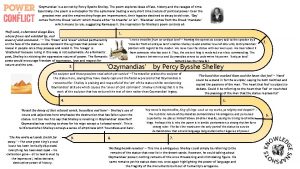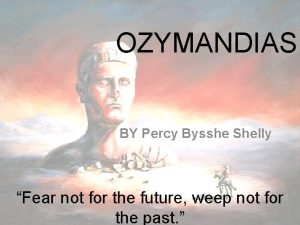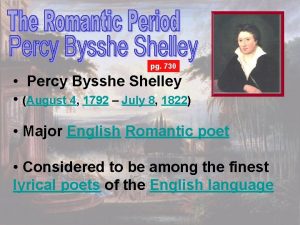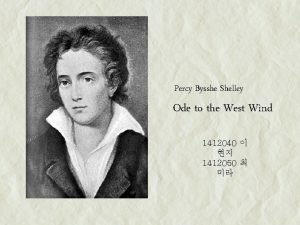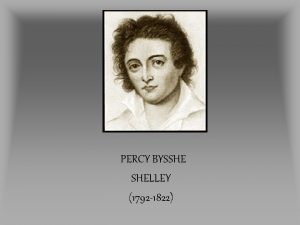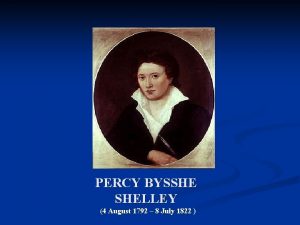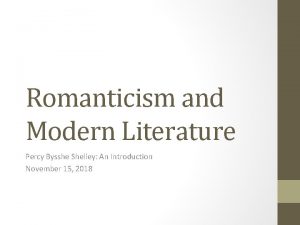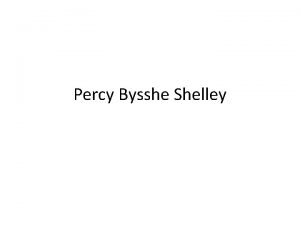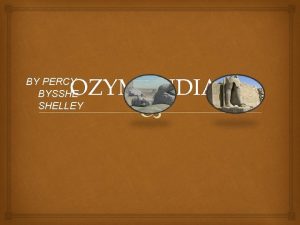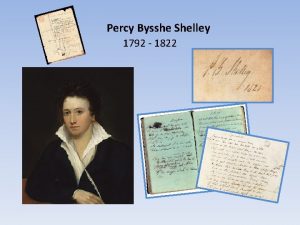Ozymandias Ozymandias Percy Bysshe Shelley Structure The poem

Ozymandias

Ozymandias – Percy Bysshe Shelley • Structure: The poem is a Petrarchan sonnet but does not follow the typical rhyme scheme linking to the idea of human power being destroyed. The narrator builds the image of the statue by focusing on different parts in comparison to the vast desert. • Irony: The poem is heavily ironic as nothing is left of Ozymandias’ power and actually proves that humans are insignificant compared to time and nature. Could link to Shelley’s personal hatred of oppression. • The poem focuses on theme of power, both human and natural/time. • Aggressive language shows the tyranny of Ozymandias.

Shelley frames the poem as a story to make it clear that the narrator hasn’t seen the statue himself but just heard about it. This emphasises how powerless Ozymandias is now. Emphasises size but also that it is incomplete Ironic – even he cant control the damage of time I met a traveller from an antique land Hints at how art Who said: Two vast and trunkless legs of stone can outlast human Stand in the desert. Near them on the sand, power but it cant immortalise it Sculptor understood Half sunk, a shatter'd visage lies, whose frown arrogance of ruler And wrinkled lip and sneer of cold command Arrogant and powerful Tell that its sculptor well those passions read – he challenged other Double meaning – is he. Which yet survive, stamp'd on these lifeless things, rulers making fun of The hand that mock'd them and the heart that fed. Ozymandias? And on the pedestal these words appear: Irony – they should actually "My name is Ozymandias, king of kings: despair because power is Stresses add to the Look on my works, ye Mighty, and despair!" temporary and unimportant Nothing beside remains: round the decay tone of command Of that colossal wreck, boundless and bare, The lone and level sands stretch far away The desert is huge and lasts Setting suggests absence of life Ruins show insignificance of humans compared to time longer than Ozymandias so he is insignificant Alliteration – emphasises the emptiness of the desert

London

London – William Blake • Structure: This is a dramatic monologue where a first person narrator comments about a walk through London and comments on the misery and despair that he witnesses along the way. The ABAB rhyme scheme is maintained throughout and could represent his footsteps. • Rhetorical language is used throughout as a form of persuasion. Other persuasive techniques including emotive language and repetition are also widely used. • Use of senses is covered in the poem but through negative and depressing imagery techniques. • Contrasts show everything is affected and nothing pure or innocent can be found.

London – William Blake First person narrator personalises the poem Double meaning – all marked by experience Repetition emphasises bleakness and despair Sounds purposeless/powerless Suggests the whole city is affected I wander thro' each charter'd street, Near where the charter'd Thames does flow. And mark in every face I meet Even nature Marks of weakness, marks of woe. is under In every cry of every Man, In every Infants cry of fear, In every voice: in every ban, The mind-forg'd manacles I hear People are trapped in everyway – no escape. human control Distressing noises add to negative experience.

London – William Blake Reference to French revolution ordinary people suffer but the rich don’t. Contrast between innocence of youth and prostitutes Innocence of newborn is immediately lost – society damages people. Usually How the Chimney-sweepers cry young boys – Every blackning Church appalls, child labour And the hapless Soldiers sigh Angry at all forms of power – blackening Runs in blood down Palace walls suggests corruptness But most thro' midnight streets I hear. Double How the youthful Harlots curse meaning – curse on Blasts the new-born Infants tear London? And blights with plagues the Marriage hearse Oxymoron Powerful language. Uncontrollable and destined suggests that everything is destroyed

Preludes

The Prelude: Stealing the Boat – William Wordsworth • This poem is an extract from one of fourteen books that make up ‘The Prelude’. It is an autobiography about Wordsworth finding a boat and going out onto the lake. He sees a mountain in the distance which he is afraid of because of it’s size and power. He goes home with his view on nature changed. • Form - a first person account written in blank verse. • Structure – there are three main sections from light and carefree to darker and fearful and finally reflection and change. • Beautiful language – is traditional for romantic poets and their description of nature. • Confident language – shows the narrator’s arrogance and power • Dramatic language – show threatening the language becomes when the mountain appears, nature is more powerful. • Fearful language – the narrator becomes less confident and scared.

Unclear who ‘her’ is, could be a personification of nature Happy rural image Narrator appears confident One summer evening (led by her) I found A little boat tied to a willow tree Within a rocky cove, its usual home. Straight I unloosed her chain, and stepping in Pushed from the shore. It was an act of stealth And troubled pleasure, nor without the voice Oxymoron hints at the narrator’s guilt. Seems familiar to him. The narrator knows he is doing something wrong – first sign something is not right.

The succession ‘I’ sound helps the poem to flow like the boat moving down the lake. Of mountain-echoes did my boat move on; Leaving behind her still, on either side, Small circles glittering idly in the moon, Until they melted all into one track

Again the narrator seems confident, maybe a bit arrogant. This contrasts with the mood of the poem. Of sparkling light. But now, like one who rows, Proud of his skill, to reach a chosen point With an unswerving line, I fixed my view Upon the summit of a craggy ridge, The horizon's utmost boundary; far above This emptiness contrasts with line 22 where he looks at the horizon and makes the mountain more shocking.

The metaphor fairies makes the scene seem magical but unthreatening. Was nothing but the stars and the grey sky. She was an elfin pinnace; lustily I dipped my oars into the silent lake, And, as I rose upon the stroke, my boat Went heaving through the water like a swan; Natural simile shows that he is confident and in control. Direct contrast with next line.

Shows a turning point in the poem, emphasised by caesura. As the mountain appears on the horizon the language becomes darker and more threatening. When, from behind that craggy steep till then The mountain is The horizon's bound, a huge peak, black and huge, personified, it’s As if with voluntary power instinct, As the narrator an ugly image Upreared its head. I struck and struck again, rows away from that contrasts to And growing still in stature the grim shape the mountain the previous section. more appears, seems like a nightmare – it is getting bigger.

The sibilance creates a sinister mood. The mountain appears calm, powerful and in control, contrasts to narrator Towered up between me and the stars, and still, For so it seemed, with purpose of its own And measured motion like a living thing, Strode after me. With trembling oars I turned, And through the silent water stole my way He’s afraid and guilty, he wants to hide away.

Back to the covert of the willow tree; There in her mooring-place I left my bark, And through the meadows homeward went, in grave And serious mood; but after I had seen That spectacle, for many days, my brain The impact was long lasting. The event left a big impact on him – ‘grave’ means serious but could suggest his own mortality.

Vague language suggests he doesn’t know what he has seen and is struggling to describe it. Worked with a dim and undetermined sense Of unknown modes of being; o'er my thoughts There hung a darkness, call it solitude Or blank desertion. No familiar shapes Remained, no pleasant images of trees, He is left feeling alone and unsettled. No longer thinks of nature in terms of pretty images. He realises there is another side.

Nature is described as a powerful and conscious being that can change and influence our lives Of sea or sky, no colours of green fields; But huge and mighty forms, that do not live Like living men, moved slowly through the mind By day, and were a trouble to my dreams. Final unsettling image helps us to empathise with him. Contrast to start.

To His Last Duchess

My Last Duchess – Robert Browning • Written in 1845. • Dramatic Monologue – a monologue is a speech that is said only by one person. In this case we are hearing one half of a conversation. The Duke talking to a servant from the Count’s party. • Situation: suspicious death of the last Duchess. Based on Alfonso II of Ferrara who may have killed his wife. • Language (narrator): Shows the Duke to be quick to anger, he only ranks his money and status as important. Tried to justify his actions to the servant. • Language (Duchess): beautiful, unique, polite, happy, young, naïve • Feelings: Anger, Jealousy, Controlling/Possessive, Dangerous, Insecure

FERRARA. Based on Alfonso II of Ferrara (Italy). First wife died 2 years after marriage of suspected poisoning. Implies previous wives trophies That's my last Duchess painted on the wall, Looking as if she were alive. I call That piece a wonder, now: Fra Pandolf's hands Worked busily a day, and there she stands. Name dropping – everything Will't please you sit and look at her? I said has monetary value Wonder implies grandure (wonders of the world) • Implies a conversation with another character. Later revealed to be a servant from the Count’s party.

“Fra Pandolf” by design, for never read Strangers like you that pictured countenance, The depth and passion of its earnest glance, Sincere But to myself they turned (since none puts by The curtain I have drawn for you, but I) Makes a big display of unveiling her – controlling even after her death

And seemed as they would ask me, if they durst, How such a glance came there; so, not the first Are you to turn and ask thus. Sir, 'twas not Her husband's presence only, called that spot Of joy into the Duchess' cheek: perhaps Jealousy

Fra Pandolf chanced to say “Her mantle laps “Over my lady's wrist too much, ” or “Paint Must never hope to reproduce the faint “Half-flush that dies along her throat: ” such stuff Was courtesy, she thought, and cause enough Dialogue: Duke is imitating the artist. Mantle = shawl/clothing worn over the chest and shoulders

metaphor For calling up that spot of joy. She had A heart---how shall I say? ---too soon made glad, Too easily impressed; she liked whate'er She looked on, and her looks went everywhere. Sir, 'twas all one!anger My favour at her breast, Pleading with the envoy – trying to justify actions

Assertive of authority (ironic – the Duke is not) The dropping of the daylight in the West, The bough of cherries some officious fool Broke in the orchard for her, the white mule She rode with round the terrace---all and each Would draw from her alike the approving speech,

Or blush, at least. She thanked men, ---good! but thanked Naivety and Somehow---I know not how---as if she ranked innocence as if Duchess doesn’t My gift of a nine-hundred-years-old name know her place Implies an affair With anybody's gift. Who'd stoop to blame Talking about his title and his surname (she would have taken it on in marriage) worth more than any other gift – shows Duke to be arrogant and thinks himself as better than anyone else.

Controls the servant with status This sort of trifling? Even had you skill In speech---(which I have not)---to make your will Quite clear to such an one, and say, “Just this Or that in you disgusts me; here you miss, Speaking to Duchess, Or there exceed the mark”---and setting if sheher letin her Ordered Herself be lessoned so, andnor plainlyplace set controlling his wife

alliteration Her wits to yours, forsooth, and made excuse, ---E'en then would be some stooping; and I choose Never to stoop. Oh sir, she smiled, no doubt, Whene'er I passed her; but who passed without The Duchess isn’t treating the Duke as someone. This special. Also suggests Much the same smile? grew; I gave Proud and that she began to feel contempt for arrogant, him as we can suppose that everyone commands; showing his superiority. Wouldn’t lower himself to his wife’s level else does

Ambiguous, implies he killed his wife by proxy. However it can be interpreted innocently so wouldn’t given him away to the servant Then all smiles stopped together. There she stands As if alive. Will't please you rise? We'll meet Drawn the The company below, then. I repeat, curtain The Count your master's known munificenceover his wife Is ample warrant that no just pretence The is known to be goodwill natured so the Dukes assumption of a Ofcount mine for dowry be and disallowed; dowry will go ahead. Dowry = a sum of money paid to the husband as compensation for taking on an extra person to care for. The Duke here again being concerned with money and riches

Attempting to show the servant that he is a sincere person Not learnt his lesson still treating women as possessions Though his fair daughter's self, as I avowed Alliteration At starting, is my object. Nay, we'll go Together down, sir. Notice Neptune, though, Taming a sea-horse, thought a rarity, Which Claus of Innsbruck cast in bronze for me! Name dropping again, this time he shows the sculpture to the servant to show he is similar to the statue by taming his wives

Charge of the Light Brigade

The Charge of the Light Brigade – Alfred Tennyson • The poem looks at a battle between the British and Russians during the Crimean War. The force were ordered to advance despite being outnumbered and defenceless. • Form – third person narrator making it feel like a story. Rhythm creates a face pace much like a march, but the broken rhyme could imitate soldiers and horses dying. Shows chaos of war. • Structure – chronological order ending in a summary. • Repetition – creates a sense of doom and inevitability. Also gives a sense of the scale – large numbers. • Heroic language – depicts the men’s bravery and how they should be remembered. • Violent language – shows the horrors and scale of war and the battle.

The Charge of the Light Brigade – Alfred Tennyson The rhythm sounds like galloping horses hooves - gives the impression that they are unstoppable. They’re presented as one group with one purpose 1. Half a league, half a league, Half a league onward, All in the valley of Death Rode the six hundred. "Forward, the Light Brigade! "Charge for the guns!" he said: Into the valley of Death Rode the six hundred. Sounds sinister, the reader is warned right from the start that something bad will happen. The commanding officer is speaking.

The Charge of the Light Brigade – Alfred Tennyson Soldiers realise the order was a mistake but they have to do what they are told. The poet respects them for this. Rhyme and repetition emphasise the soldiers’ obedience and sense of duty even though they know they will be killed. 2. "Forward, the Light Brigade!" Was there a man dismay'd? Not tho' the soldier knew Someone had blunder'd: Theirs not to make reply, There’s a line in the that says “Yea I Theirs not to reason why, bible walk through the valley Theirs but to do and die: of the shadow of death, will fear no evil. ” Into the valley of Death IUsing biblical Rode the six hundred. references make it seem significant.

The Charge of the Light Brigade – Alfred Tennyson Repetition at the start and end of lines show the soldiers are surrounded. 3. Cannon to right of them, The first Cannon to left of them, three stanzas Sibilance shows end with the Cannon in front of them the bullets flying same line. It at them adds a sense Volley'd and thunder'd; of foreboding These images and reminds us. Storm'd at with shot and shell, personify death how many hell and soldiers there Boldly they rode and well, and make it seem like are. Into the jaws of Death, the soldiers cant escape. Into the mouth of Hell

The Charge of the Light Brigade – Alfred Tennyson Reminds us they only had swords against the guns of the Russians. Several lines begin with verbs emphasising the action. The repetition of ‘not’ shows that some have been killed and gives a stuttering, upset effect. 4. Flash'd all their sabres bare, Flash'd as they turn'd in air, Sabring the gunners there, Charging an army, while All the world wonder'd: Plunged in the battery-smoke Right thro' the line they broke; Cossack and Russian Reel'd from the sabre stroke Shatter'd and sunder'd. Then they rode back, but not Not the six hundred. The repetition of flash’d and the rhyme create a powerful image. Double meaning – why had they been sent on the charge? Or marvelling at their strength and bravery. Sibilance is vicious

The Charge of the Light Brigade – Alfred Tennyson Similar to stanza three but they are now retreating. The phrase ‘left of’ reminds us that many have died. 5. Cannon to right of them, Powerful Cannon to left of them, onomatopoeia – Cannon behind them sounds of war Volley'd and thunder'd; Storm'd at with shot and shell, While horse and hero fell, They that had fought so well Admiration and Came thro' the jaws of Death sadness Back from the mouth of Hell, All that was left of them, Left of six hundred.

The Charge of the Light Brigade – Alfred Tennyson Rhetorical question to challenge the reader. Dramatic and daring. 6. When can their glory fade? O the wild charge they made! All the world wondered. Honor the charge they made, Honor the Light Brigade, Noble six hundred. The command is repeated to show the audience should honour the cavalry

Exposure

Exposure – Wilfred Owen • Content: This poem is about Wilfred Owen’s personal experience in WW 1, during a winter period in which the soldiers are waiting for an attack. • Imagery techniques: simile, metaphor, personification used throughout to create a visual of the horrors faced during the first World War.

Links to Keats. They are living through the horrors that the romantics couldn’t dream of. Personification: shows the danger of the cold together with the pain it inflicts. Our brains ache, in the merciless iced east winds that knife us. . . Wearied we keep awake because the night is silent. . . Low drooping flares confuse our memory of the salient. . . Worried by silence, sentries whisper, curious, nervous, But nothing happens. Silence is more worrying as they don’t know where the enemy is

Personification of wind as it pulls on the wire Watching, we hear the mad gusts tugging on the wire. Like twitching agonies of men among its brambles. Northward incessantly, the flickering gunnery rumbles, Far off, like a dull rumour of some other war. What are we doing here? Barbed wire Lying in the open in freezing conditions a psychological voice is bidding them to walk away is linked to brambles, nature is represented by machines

Dawn should bring the promise of a new day but just brings another cold day The poignant misery of dawn begins to grow. . . We only know war lasts, rain soaks, and clouds sag stormy. Dawn massing in the east her melancholy army Attacks once more in ranks on shivering ranks of grey, But nothing happens. List of three Personification of the weather. shows the link between suffering caused by war and weather

The snow is more deadly than bullets Tired of the snow attacking, regrouping and attacking again Sudden successive flights of bullets streak the silence. Less deadly than the air that shudders black with snow, With sidelong flowing flakes that flock, pause and renew, We watch them wandering up and down the wind's nonchalance, But nothing happens Nature does not care about the soldiers Except tiny changes in time of day, weather and progress of war.

Personification of the snow seeking them out Pale flakes with fingering stealth come feeling for our faces We cringe in holes, back on forgotten dreams, and stare, snow-dazed, Deep into grassier ditches. So we drowse, sun-dozed, Littered with blossoms trickling where the blackbird fusses. Is it that we are dying? Shell holes Trapped in no mans land between life and death Although the sun shines through the cold they see flowers and blackbirds dying.

Fires are almost dead they are beautiful but offer no comfort The insects and creatures can be there but they cant Slowly our ghosts drag home: glimpsing the sunk fires glozed With crusted dark-red jewels; crickets jingle there; For hours the innocent mice rejoice: the house is theirs; Shutters and doors all closed: on us the doors are closed We turn back to our dying. The house has been deserted but would be shut against them if they did desert They are dying Links to Ivor Novello

Since we believe not otherwise can kind fires burn; Now ever suns smile true on child, or field, or fruit. For God's invincible spring our love is made afraid; Therefore, not loath, we lie out here; therefore were born, For love of God seems dying. Dying willingly Their religious beliefs about the world and nature are being tested to the full Akin to hanging on a cross? Suffering for others.

September 1918 The cold will take its victims Tonight, this frost will fasten on this mud and us, Shrivelling many hands and puckering foreheads crisp. The burying-party, picks and shovels in their shaking grasp, Pause over half-known faces. All their eyes are ice, But nothing happens. Circular: ends where it began One more night in the open will finish them off

Storm on the Island

Storm on the Island – Seamus Heaney • Form: The poem is written in blank verse which sounds like a conversation – particularly with the personal pronouns and direct address. • Structure: Shifts from security to fear, contrasting descriptions show this. • Violent imagery: shows the storm is war like terms with imagery techniques. • Appeals to our sense of sound.

Storm on the Island – Seamus Heaney Strong opening statement of safety Safety reinforced with end stopping. We are prepared: we build our houses squat, Sink walls in rock and roof them with good slate. This wizened earth has never troubled us With hay, so, as you see, there are no stacks Nothing grows there Or stooks that can be lost. Nor are there trees barren

Storm on the Island – Seamus Heaney Emphasises lonely setting Which might prove company when it blows full Blast: you know what I mean - leaves and branches Narrator Can raise a tragic chorus in a gale Violent speaks to Onomatopoeic sound verb So that you listen to the thing you fear audience, has greater impact. Suggests islanders are makes them Forgetting that it pummels your house too. left on their own – reflect Greek ‘chorus’ = explains events

Storm on the Island – Seamus Heaney Caesura slows pace of the line But there are no trees, no natural shelter. You might think that the sea is company, Exploding comfortably down on the cliffs But no: when it begins, the flung spray hits The very windows, spits like a tame cat Oxymoron juxtaposes fear and safety Assonant ‘I’ and sibilant ‘s’ creates sound of wind and rain Shows familiarity during the storm

Storm on the Island – Seamus Heaney Turned savage. We just sit tight while wind dives And strafes invisibly. Space is a salvo, We are bombarded with the empty air. Strange, it is a huge nothing that we fear. Invisible storm Language normally describes war contrasts with the solid rock.

Bayonet Charge

Bayonet Charge – Ted Hughes • Form: although the poem is split into stanzas, nothing is regular which mirrors the images of war. • Structure: The poem starts in the middle of the action and moves through the soldiers feelings as he stands still and eventually gives up. • Violent images link to war, particularly sights and sounds. • Figurative language emphasises horror and pain. • Natural imagery contrasts to the ideas of war.

Bayonet Charge – Ted Hughes Sounds as if he’s in a confused between a dream and reality = vulnerable Violent imagery describes sounds and impact. Suggests discomfort and inexperience Repeated ‘h’ imitates heavy breathing Suddenly he awoke and was running – raw In raw-seamed hot khaki, his sweat heavy, Stumbling across a field of clods towards a green hedge That dazzled with rifle fire, hearing Simile foreshadows injuries Bullets smacking the belly out of the air – He lugged a rifle numb as a smashed arm; The patriotic tear that had brimmed in his eye Sweating like molten iron from the centre of his chest, – Patriotism has turned to fear and pain – replaced by painful reality

Bayonet Charge – Ted Hughes Pauses the action Shows how insignificant he is. Creates an image of someone blind and irrational. Petrified In bewilderment then he almost stopped – In what cold clockwork of the stars and the nations Was he the hand pointing that second? He was running Like a man who has jumped up in the dark and runs Listening between his footfalls for the reason Of his still running, and his foot hung like Statuary in mid-stride. Then the shot-slashed furrows Caesura ends thoughts, forcing him back to reality

Bayonet Charge – Ted Hughes Shows danger that he is in Suggests fear and pain Out of control movement – nature is also affected by war Threw up a yellow hare that rolled like a flame And crawled in a threshing circle, its mouth wide Open silent, its eyes standing out. He plunged past with his bayonet toward the green hedge, King, honour, human dignity, etcetera Dropped like luxuries in a yelling alarm To get out of that blue crackling air His terror’s touchy dynamite. Acting out of desperation Not even worth listing the reasons to go to war A weapon rather than human being

Remains

Remains – Simon Armitage • Form: There is no regular length of lines, stanzas or rhyme scheme and it is written as if someone is telling a story, making it more personal and like a confession. • The poem is written like an anecdote but becomes a description of a man’s death. • Graphic imagery describes the death in horrid detail and shows how desensitised to violence the narrator is. • Colloquial language trivialises the man’s death. • Repetition reflects the way that the killing is repeated in the narrator’s mind.

Remains – Simon Armitage Sounds like a series of stories On another occasion, we get sent out to tackle looters raiding a bank. And one of them legs it up the road, Colloquial makes the story sound ordinary. probably armed, possibly not. Doubt contrasts to the action that follows

Remains – Simon Armitage Repetition to emphasise it wasn’t just him – guilty feeling? Well myself and somebody else and somebody A surprise – violence else clashes with casual tone are all of the same mind, so all three of us open fire. Three of a kind all letting fly, toand I swear Switching ‘I’ makes it more personal.

Remains – Simon Armitage Repetition emphasises visual horror. Violent metaphor contrasts to casual tone I see every round as it rips through his life – I see broad daylight on the other side. So we’ve hit this looter a dozen times and he’s there on the ground, sort of inside out, Exaggerated, hyperbolic language A childish description, is the narrator struggling to process it?

Remains – Simon Armitage pain itself, the image of agony. One of my mates goes by and tosses his guts back into his body. Then he’s carted off in the back of a lorry. Casual and cold actions suggest no respect for the dead.

Remains – Simon Armitage Volta in the poem shows change of mood Reflects the horror is continued in a blink, like the enjambment End of story, except not really. His blood-shadow stays on the street, and out on patrol I walk right over it week after week. simple sentences Then I’m home on. Short leave. But I blink suggest that he believes it Visual reminder of death, foreshadows that he will be haunted by it will be forgotten when he is home.

Remains – Simon Armitage Words separated by caesuras like gun shots. Repetition shows he is reliving the memory. and he bursts again through the doors of the bank. Sleep, and he’s probably armed, possibly not. Dream, and he’s torn apart by a dozen rounds. And the drink and the drugs won’t flush him out –

Remains – Simon Armitage Metaphor shows the memory is stuck in his mind like a soldier stuck in a trench. he’s here in my head when I close my eyes, dug in behind enemy lines, not left for dead in some distant, sun-stunned, sand-smothered land or six-feet-under in desert sand, Violence is shown within the adjectives, sibilance and pace reflect a lack of clear thought.

Remains – Simon Armitage but near to the knuckle, here and now, his bloody life in my bloody hands. Double meaning He feels entirely responsible. Reference to Lady Macbeth and the cliché that he now has blood/guilt/life on his hands.

Poppies

Poppies – Jane Weir • Form: first person narrative shows mother’s strong emotions. No rhyme or rhythm suggests that this is a stream of consciousness. • Poem has a chronological structure but the time frame is ambiguous. • Sensory imagery shows the harsh separation from her son. • War imagery shows the sons new identity and makes the reader question if he is still alive. • Domestic imagery show the contrasts between war and home life.

Poppies – Jane Weir A reminder that war kills individuals, therefore the loss is personal. Repetition shows link between personal and national mourning and remembrance. Three days before Armistice Sunday and poppies had already been placed on individual war graves. Before you left, I pinned one onto your lapel, crimped petals, spasms of paper red, disrupting a blockade Suggests an injured She feels shut of her of yellow biasbody. binding around your blazer. sons life

Poppies – Jane Weir Sellotape bandaged around my hand, Shows that she is wounded her son leaving and he I rounded up as many white cat hairs by as I could, smoothed down your shirt's may be wounded in war. may be the last time upturned collar, steeled the softening This she can do this. of my face. I wanted to graze my nose Alliteration shows she is across the tip of your nose, play at trying to be brave. being Eskimos like we did when longs for closeness but you were little. I resisted the impulse She this emphasises the to run my fingers through the gelled distance between them. blackthorns of your hair. All my words flattened, rolled, turned into felt, Shows that she speaks Caesuras show that she is trying to stay in control of her emotions. softly to her son.

Poppies – Jane Weir Her composure disappears slowly melting. I was brave, as I walked Suggests she is no longer with you, to the front door, threw brave. it open, the world overflowing Sudden movement. like a treasure chest. A split second Simile looks at the world and you were away, intoxicated. from her sons point of After you'd gone I went into your bedroom, view. released a song bird from its cage. Excitement is at odds with Later a single dove flew from the pear tree, mothers worry and suggests a lack of control and this is where it has led me, skirting the church yard walls, my stomach busy making tucks, darts, pleats, hat-less, without Symbolises him leaving. a winter coat or reinforcements of scarf, gloves. A dove suggests peace but here mourning. Sewing imagery conveys her In contrast, battle imagery makes her seem more vulnerable.

Poppies – Jane Weir A reminder of the risks her son is facing, A sense of touch is important as she cant touch her son. On reaching the top of the hill I traced the inscriptions on the war memorial, visual image of leaned against it like a wishbone. something strong. The dove pulled freely against the sky, an ornamental stitch. I listened, hoping to hear your playground voice catching on the wind. Something small and beautiful like her son. Links leaving with the army to leaving school.

War Photographer

War Photographer – Carol Ann Duffy • The poem has four stanza’s of equal length (sestet) and a regular rhyme scheme which suggests the care of the photographer trying to make order out of the chaos of war. • The poem follows the actions and thoughts of the photographer but there is a volta at the start of stanza 3 which shifts to a specific memory. • Religious imagery is included that likens the photographer to a priest. • Contrasts are given between the photographer in England war zones. • Emotive language is designed to get the reader to think about the true horrors of war.

War Photographer Sibilance. The poem is composed of regular sestets but the rhyme scheme is also regular. It imposes a regularity and creates meaning from chaos Implied contrast Safe light in a darkroom In his darkroom he is finally alone With spools of suffering set out in ordered rows. The only light is red and softly glows, As though this were a church and he A priest preparing to intone a Mass. Belfast. Beirut. Phnom Penh. All flesh is grass. Suggests a care of the photographer of trying to create a sense of empathy in the audience. Simile of the priest is apt because the photos are precious. Places associated with war Unlike napalm and bombs From Isaiah 46 which shows the nature of human and reflects the easy passing of life in war

War Photographer Ambiguous – chemical solutions or solutions to war? Slop suggests casual and careless – a messy situation He has a job to do. Solutions slop in trays Beneath his hands which did not tremble then Though seem to now. Rural England. Home again To ordinary pain which simple weather can dispel, To fields which don’t explode beneath the feet Of running children in a nightmare heat. Innocent could end with the threat of death Delicate process that needs a steady hand. PTSD? Comparison between rural England war torn countries gives an immediate association

War Photographer Developing the photograph Suggests pain but also developing the photos Something is happening. A stranger’s features Faintly start to twist before his eyes A half formed ghost. He remembers the cries Of this man’s wife, how he sought approval Without words to do what someone must And how the blood stained into foreign dust. Didn’t help in the war but sought approval to take the photos – could not help the situation Suggests he doesn’t like his job

War Photographer Day of rest Contrasts between good and evil, truth and lies A hundred agonies in black-and-white From which is editor will pick out five or six For Sunday’s supplement. The reader’s eyeballs prick With tears between the bath and pre-lunch beers. From the aeroplane he stares impassively at where He earns his living and they do not care. Trivialises the experience cannot show war in 5 images Contrasts to war Moved only by material self or entertainment Suggests he used to feel better about England
- Slides: 82
